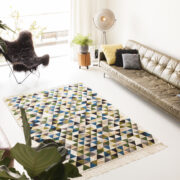Especially for the readers of NRC, Fair Fabrics, in collaboration with one of its Tunisian workshops and designer Willemiek van Kuijlenborg, developed a wool rug made in a numbered edition.
>>The rug is sold out at the NRC web store. Please contact us if you still want to order this rug and specify the desired size: info@fairfabrics.nl
Rugs create great atmosphere in your home and offer a lot of extra comfort. They improve the acoustics, make the interior personal and insulate in both winter and summer. The combination of old techniques with this contemporary pattern gives your interior a pleasant atmosphere and is a real eye-catcher. Rugs are very nice for the layout of your living space. You can break a large space with it, while a small space with a rug gets depth.

Photo: Geert van Hertum
The rugs are handcrafted by the members of a women’s cooperative in a small mountain village in northern Tunisia. The many years of experience of the weavers ensure tight weaving, creating a high-quality rug that you will enjoy for years to come. All affiliated women are now working together on the growth and professionalization of their studio. All rugs are provided with a label with the name of the maker.

Photo: Moncef Ben Rajeb
Naima runs a workshop in the north-east of Tunisia. She has been working as a weaver for over 20 years, currently she does so together with about 25 other women from the same mountain village.
The rugs are made differently in each area in the country, the Naima region distinguishes itself with the double-sided carpets. They are made in a special way so that the carpets can be used on both sides.
Naima learned weaving and the technique from her mother as a child. When she got married and had children, she stopped weaving in order to spend enough time with her family. When the children were grown she had time to pick up her passion again. It makes her happy and she really wouldn’t know what to do without it.
“Life is short, a craft takes a lot of time to learn.”
It took Naima 5 or 6 years to gain confidence in her own craftsmanship. Handmade work is really difficult unlike the machines that you can master quite quickly.

Photo: Moncef Ben Rajeb
Naima is keen to convey to the young generations that they must continue to develop their craft skills, as this is the only way to preserve the cultural heritage.
“My advice to young designers is that they should open up to other cultures and other countries.”
In this way, the younger generations from Tunisia can increase their knowledge of foreign designs so that they can better position themselves and stay on the right path.
Naima likes to recall an old Tunisian saying:
“All tangible inherited things will disappear, but the inherited knowledge can never be buried.”

Photo: Geert van Hertum

